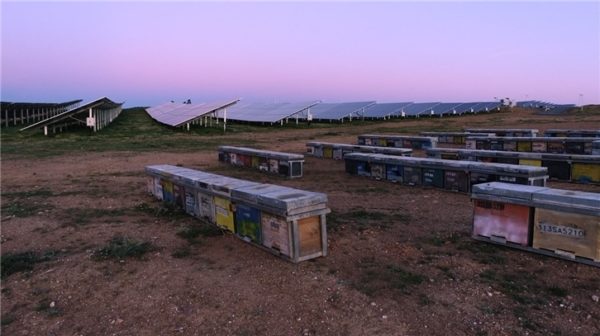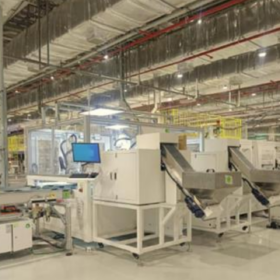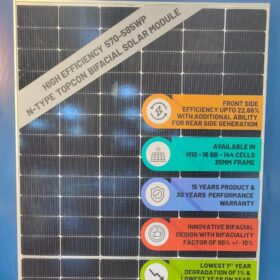From pv magazine International
Bees are extremely important, not just because my name starts with one, but also because they’re responsible for approximately 70% of the fruits, vegetables and nuts we humans consume daily. However, since the mid-2000s a species threatening “Colony Collapse Disorder” has seen commercial bee populations decimated.
For this reason, scientific researchers have been investigating novel land management practices and some of the most promising involve the symbiotic relationship between agriculture and PV. One such study, published in the journal Biological Conservation, examined the economic benefits of beehive integration with solar farms.
Enter Agrivoltaics
The symbiotic benefits of agrivoltaics are increasingly well documented, and many have suggested incorporating honeybee hives on solar parks as a symbiotic twofold solution to the problems of bee populations and expanded renewable energy capacity.
In the United Kingdom (UK) a team of researchers from the universities of Lancaster and Reading have published a study finding that the value of UK agriculture could be boosted by millions of pounds annually if honeybee hives were incorporated on solar parks throughout the country.
However, the scientists behind the study made it clear that wild pollinators should be prioritized over honeybees where appropriate when it comes to the management of solar farms. Solar farms are essential to the energy transition and environmental sustainability, but they do occupy large tracts of land and should, therefore, bring added environmental and commercial benefits where possible.
Of course, many solar farms are located in agricultural regions where wild pollinator habitats have been long-degraded or eradicated. For these, honeybee hives would be welcome additions, providing pollinators that would increase crop production.
“Managing solar parks for honeybees can have positive impacts on crop yields and thus financial returns,” said Alona Armstrong, senior lecturer at Lancaster University, “But, it is important to consider the suitability on a site by site basis given the potential implications for wild pollinators and the benefits of managing sites for biodiversity more broadly.”
Solar P-Bee
Of course, there are solar farms that already have bees hard at work. For instance, Iberdrola has built an apiary at its Andévalo photovoltaic plant near Huelva, in Spain’s Andalucia region, hosting 165 beehives and more than 8 million bees, and another one at its Núñez de Balboa project in Usagre, near Badajoz in the country’s Extremadura region, hosting 105 beehives and five million bees.

However, the economic benefits of this symbiotic relationship hadn’t been quantified until this UK study. Mindful of the cost of installing and managing the beehives, the research team utilized detailed land cover maps to compare solar park locations with crop distributions, as well as existing honeybee hive data, pollination requirements and crop values to determine that honeybee deployment on solar parks could have raised crop yields by £5.9 million in 2017 alone.
Among UK nations, England was the country that would most benefit from honeybee hive integration, mainly because oilseed is so widely cropped. However, the researchers also looked at crops of field beans, linseed, pears, apples, strawberries, blackcurrants and raspberries, and found that the soft fruits like berries would benefit the most on a per capita basis.
The field crop yields were found to benefit by £2.6 million, while top fruits such as those used to make cider would see a boost of £1.3 million and soft fruits £1.9 million.
Ultimately, and it is, of course, a hypothetical (albeit an instructive one), the report found that if all UK crops were grown within a 1.5km radius of a honeybee hive housed solar park, the value of those crop yields could increase by £80 million each year.
“Our study demonstrates how multi-disciplinary research can find novel land management practices,” said one of the study’s co-authors, Simon Potts of the University of Reading, “which can simultaneously benefit energy producers, farmers, beekeepers and consumers.”
This content is protected by copyright and may not be reused. If you want to cooperate with us and would like to reuse some of our content, please contact: editors@pv-magazine.com.









1 comment
By submitting this form you agree to pv magazine using your data for the purposes of publishing your comment.
Your personal data will only be disclosed or otherwise transmitted to third parties for the purposes of spam filtering or if this is necessary for technical maintenance of the website. Any other transfer to third parties will not take place unless this is justified on the basis of applicable data protection regulations or if pv magazine is legally obliged to do so.
You may revoke this consent at any time with effect for the future, in which case your personal data will be deleted immediately. Otherwise, your data will be deleted if pv magazine has processed your request or the purpose of data storage is fulfilled.
Further information on data privacy can be found in our Data Protection Policy.